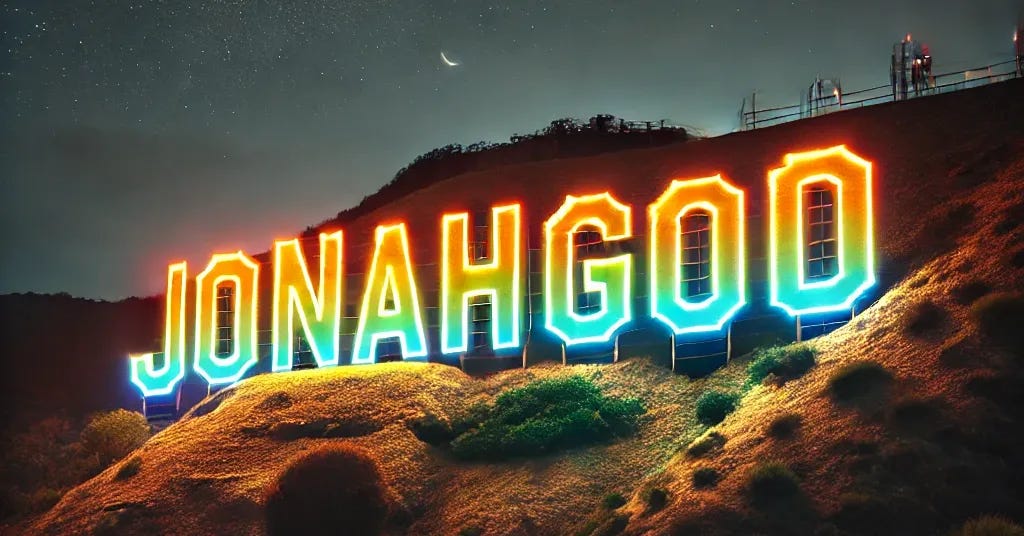Jonahgod lived in Jerusalem. One day, the Jews came to him. “Our compatriots in a faraway land require your aid,” they read aloud, handing him a letter. “Save them, for the sake of your covenant with our ancestors.”
But Jonahgod did not wish to help the Jews, as they had long suspected but only rarely admitted out loud. Jonahgod had long ago lost interest in the covenant that they had made and had spent many years holed up in his home (the address was unlisted and there was no sign on the door), letting the mail pile up against the wall. That the Jews had reached him at all was something of a minor miracle and a sign of their persistence. It was only after knocking on every door that, by pure chance, they happened upon his.
Jonahgod did not give them the satisfaction of learning that they had reached him. Rather than providing salvation, he chose to flee. At midnight he donned a mask and rode his mule down to the Jaffa port. He found a fast ship, scheduled to leave that very day for a city as far away from the Jews as possible.
The captain looked quizzically as Jonahgod paid his fare. Who was this tall man with broad shoulders, and why was his face hidden by a frightening mask? But the captain was a Philistine and he had seen many strange things on his voyages. It was not his job to ask such questions. Jonahgod boarded the ship and retreated to his cabin on its lowest deck.
Jonahgod hoped to evade the Jews by traveling to a place where they would not follow, but he made a mistake, for he had completely stopped paying attention to the Jews and knew nothing of who they had become. Their present form was a mystery to him; he imagined them as infants, but they were in fact fully grown and bore the scars of suffering. He did not know, for example, that in his centuries of neglect the Jews had been dispersed to every corner of the world, so that there was no longer any place where they could not be found. They were everywhere; Jonahgod was not.
As it happened, half of the passengers on the ship were Jews. They were fleeing Jerusalem for opportunities on the other side of the world. They recognized Jonahgod by his mask and began pressing him with questions: Where were you? Why did you not answer us when we called you so very many times? Jonahgod retreated to his cabin, but they followed him, breaking down the door and plunging inside. Jonahgod, they screamed. Why did you allow us to suffer?
Jonahgod was overwhelmed. The people before him were so unlike the desert Jews, whose eyes had been filled with gratitude for salvation and a desire to make a new start. These Jews were angry and full of memory. They recounted scenes of horrific violence and Jonahgod recoiled, both because he could not believe what he was hearing and because he had no answers to give.
Feeling cornered, Jonahgod did not wish to speak with these Jews. He called up a great storm, which tossed the ship and made the Jews at his door fall away. Then, with a touch of his finger, he opened the hull of the ship. The waters rushed in and Jonahgod dropped like an iron bar into the midnight sea.
The Jews tried to stop the leak, but it was too late. Aboard the doomed vessel, they used their final breaths to pray that Jonahgod save himself. A nearby whale heard their cries and swallowed him whole.
As Jonahgod sat in darkness, he considered the Jews he had just drowned. Their anger scared him, and their omnipresence unsettled him. How long had it taken them to become so angry? Did they anger more slowly than even he? How had they recognized him by his mask? Was this whale, too, a Jew? Jonahgod wondered many things, but most of all he realized that he did not understand why the Jews cared to know him at all. After so many centuries of silence why did they persist in their belief of his existence? Why had they not moved on?
Something stirred in him: a memory of the desert, when the first generation to be born free of Egyptian bondage followed his every step across the Sinai. Those were the years of possibility, back before all the promises had been broken and he had retreated to his apartment. The Jews of the desert understood that everything would be fine; they did not yet have any reason to think that that it would not. Perhaps, Jonahgod considered, something of those desert Jews had persisted after all. They were still motivated by that underlying faith. Perhaps, he thought, they are simply waiting for me to do what I said I was going to do.
“I’m ready,” he said, and the whale spit him onto the shore. He was a mile from the city where the Jews had asked for aid.
Jonahgod entered the city to find that it was at war. A third of the buildings were destroyed; others were smoldering. Burned-out tanks stood on highways. A dog chewed on a unburied corpse. The air smelled like death.
He stood in the middle of a wide road and lifted his hands. “This city will be destroyed in forty days if you do not change your ways,” he said. “I will make it so, for I am Jonahgod. It was I who took the Jews out of Egypt, and I am here now to protect them from harm.” A group of nearby children heard the message and ran to tell their parents. Soon a crowd began to gather.
An old man in a beret and a general’s uniform approached and the crowd parted before him. “You are?” the general asked.
“I am Jonahgod,” he said, still wearing his mask.
“And you will destroy our city in forty days?”
“Yes,” he said. “For the sake of my covenant with the children of Israel, which I have not forgotten.”
The general frowned. “We all want this war to end. What do you want from us?”
“The bloodshed must stop.”
The general nodded slowly, thinking. “I see. If that is what you require, then I will see to it personally.”
The general climbed to the top of a nearby pile of rubble. “My people,” he said, “it is time for the fighting to end. If we want to survive with what little we still have, we must stop the fighting. This war is over.”
Most of the crowd cheered, but a minority booed. Someone shouted, “But yesterday you said that this is a fight for our survival. You said we can’t let them—“
The general cut him off. “The war is now over,” he repeated. “We will find another way.” The crowd again cheered; they began chanting find another way. The general removed his beret. Producing a lighter from his pocket, he set it on fire, to continued cheers.
Jonahgod left the city and found a nearby hill from which to observe it. Would the city be destroyed anyway, as the man in the crowd had said? Did he know something that Jonahgod did not? Troubled at not knowing the answer, Jonahgod decided to sleep.
It was night when he awoke. A man was gently shaking him by the shoulder: the general. “Hello,” he said. “Are you alright?”
Jonahgod sat up and found himself looking directly at the city, which was almost unrecognizable. All evidence of destruction had been removed, and the sky was now filled with cranes and new construction. The lights of the city glittered like jewels. A cool breeze carried the sounds of people dancing.
“How long was I asleep?” Jonahgod asked.
“Perhaps forty days,” said the general. He was wearing civilian clothing. “We move quickly.”
“So the city was not destroyed?”
“No,” said the general. “We remade it, in our image. All thanks to you.”
“How did you end the fighting?”
“We convinced everyone that fighting was not in their best interest.”
“But how?”
The general smiled again. “You’re surprisingly curious. What matters is that the threat to the Jews is gone.”
“And why should I trust you, of all people, to tell me that?”
The general laughed, which caught Jonahgod off guard. “Who else should you trust?” he said. “It’s our city. A Jewish city.”
“You’re Jewish?”
“Should I really be surprised that you can’t recognize one of your own?” The general jumped to his feet and snapped to attention. “Our compatriots need your aid,’” he recited. “Save them, for the sake of your covenant with our ancestors.” He gave Jonahgod a salute.
“You wrote the letter?” Jonahgod asked.
“Perhaps. I’ve written that letter to you a thousand times in a thousand ways,” the general said. “Many of us did. You see, I never stopped believing in you.”
“But I abandoned you,” said Jonahgod.
“Yes,” said the general. “That was what sustained my belief in you despite your insufferable silence. The belief that you had simply abandoned us. That is Judaism’s core belief. Everyone knows that.”
Jonahgod stood up and again looked out at the city. On a hill near its center, the word JONAHGOD was spelled out in huge neon letters.
“And the people you were fighting?” asked Jonahgod. “Were they Jewish, too?”
The general looked Jonahgod in the eye. “Maybe they were and maybe they weren’t,” he said. “But I must say, your curiosity is surprising. Of all the people in the world, it is us who you abandoned, and it is us who you so long ignored. Now, suddenly, you care about somebody else?”
Jonahgod turned away. “I should not have abandoned you,” he said. “I should not have abandoned anyone.”
The general smiled, then covered his eyes with his right hand. “Hear, O Israel,” he prayed. “The Lord our God, the Lord is One!” And under his mask, Jonahgod blushed.





Wow. Interesting take on the Jonah story; the notion that God is a nice idea, but uniting and depending on ourselves is our only salvation, isn't it?